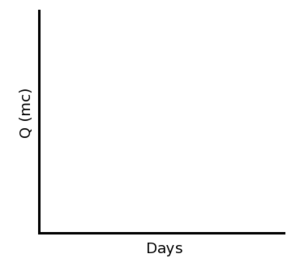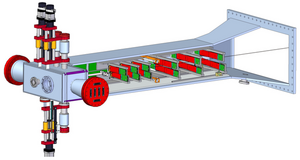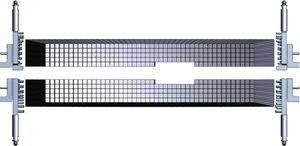Difference between revisions of "The HPS Run Wiki"
| Line 296: | Line 296: | ||
!colspan=2 style="background:#ffdead;" | Beamline On-Call | !colspan=2 style="background:#ffdead;" | Beamline On-Call | ||
|- | |- | ||
| − | | | + | | NOW || Takashi Maruyama |
|} | |} | ||
| Line 303: | Line 303: | ||
!colspan=2 style="background:#ffdead;" | DAQ On-Call | !colspan=2 style="background:#ffdead;" | DAQ On-Call | ||
|- | |- | ||
| − | | | + | | NOW || Sergey Boyarinov |
|} | |} | ||
Revision as of 20:09, 21 March 2015
Important Phone NumbersShift ScheduleChecklists |
Procedures |
Manuals |
JLab Logbooks
|
RC: John Jaros
PDL: Harut AvagyanEvery Shift:
SVT InstructionsBefore sending beam to Faraday cup, verify (and page expert if otherwise):
The first time sending beam to the Faraday cup after the hall is closed, page the SVT expert. Every Run:
|
Run Plan:March 21-22, 2015 (day/swing/owl)Overview: Machine has delivered beam to Hall A. Machine instabilities prevent sending beam to Hall D. Machine will work on instabilities today, and deliver beam to Hall B, beginning with day shift. BPM calibrations are postponed to Monday--we aren't ready today, and people aren't available on Sunday. Once beams are reestablished, we'll go to backup subsystem commissioning program. Program: 1) restore beams to tagger; (2)take beams to Hall B dump and install SVT Collimator; (3) set up chicane and test beam location on target; (4)re-establish DAQ and data taking; (5) Subsystem commissioning studies: trigger commissioning studies, struck scaler studies at 2H02, SVT commissioning. Always Setup Beam to the Hall-B Tagger Dump after long down
Upstream halo counters must count <10Hz, downstream counters ~Hz
Setup Beam to the Hall-B Faraday cup Dump and Setup HPS.
Move beam with upstream correctors only This will guarantee small angles through HPS and safety of SVT
Beam should be centered using correctors on 2C21, 2C23, and 2C24 girder
Energize chicane.
Be very careful when changing magnet currents when beams are on. Must enter new current ACCURATELY. Small steps only.
Subsystem Commissioning Studies. Begin Data Taking.
| ||||||||||||||||||||||||||||||||||||||||||||||
|
|
| ||||||||||||||||||||||
|
|
|
|
| ||||||||||||||||||||||||||||||||||||||||||||||
|
Webcams:
|
Slow Controls: |
Accelerator:
|
Offline: |


